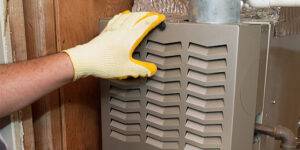For Tampa Bay, FL, homeowners and business owners, understanding the lifespan of your gas furnace is key to ensuring warmth and comfort during cooler months. This guide will help you determine the life expectancy of your gas furnace and what factors influence it.

Understanding the Life Expectancy of a Gas Furnace
The average lifespan of a gas furnace is typically between 15 to 20 years. However, this can vary based on several factors, including the brand, installation quality, usage patterns, and how well it has been maintained over the years. By understanding these factors, you can get a better estimate of how long your gas furnace will last.
Key Factors Influencing Life Expectancy
- Quality of the Furnace: Higher quality furnaces with a reputation for durability tend to have a longer average life expectancy than cheaper models.
- Proper Installation: Correct installation by a professional is crucial for ensuring the longevity of your furnace. Improper installation can lead to frequent repairs and shorten its lifespan.
- Regular Maintenance: Annual inspections and maintenance by a certified technician can significantly extend the life of your furnace. This includes cleaning, adjusting, and replacing parts as needed.
- Usage Patterns: The more frequently your furnace runs, the more wear and tear it experiences. Homes in colder climates or with higher heating demands may see a shorter furnace lifespan.
- Environmental Conditions: Furnaces in areas with high humidity, such as Tampa Bay, FL, may experience more stress due to corrosion, potentially affecting their average furnace lifespan.
Signs It’s Time for a Replacement
- Frequent Repairs: If your furnace requires frequent repairs, especially in the last two years of its life, it may be more cost-effective to replace it.
- Energy Bills Increasing: An increase in your energy bills can indicate that your furnace is losing energy efficiency.
- Inconsistent Heating: If some rooms are too hot while others are too cold, your furnace may be failing.
- Strange Noises: Unusual sounds like rattling, buzzing, or humming can signal that you’re nearing the end your furnace life expectancy.
- Age: If your furnace is over 15 years old, it’s wise to start considering a replacement.
Location-Specific Advice for Tampa Bay Residents and Businesses with a Gas Furnace
In the unique climate of Tampa Bay, FL, where mild winters are the norm, ensuring your gas furnace operates efficiently and lasts as long as possible requires some specific considerations. Here are tailored tips for Tampa Bay residents and businesses to get the most out of their gas furnaces:
Optimize Your Usage:
Given the milder climate, consider setting your thermostat to a lower temperature in winter to reduce the strain on your furnace. This can extend its lifespan and lower your energy bills.
Combat Humidity:
Tampa Bay’s high humidity can affect your furnace’s components, potentially leading to corrosion over time. Use a dehumidifier during the humid months to protect your furnace and improve indoor air quality.
Regularly Check for Corrosion:
Due to the salty air from the Gulf, especially in coastal areas, it’s important to inspect your furnace for signs of rust or corrosion more frequently than in other regions. Early detection can prevent significant damage.
Ensure Proper Ventilation:
Good ventilation is crucial in humid climates to prevent mold growth and maintain air quality. Ensure your furnace room is well-ventilated to avoid moisture buildup that can harm your system.
Invest in a Good Filter:
Use a high-quality air filter to protect against the fine particulates common in Florida’s air. Change it regularly to maintain airflow and furnace efficiency.
Schedule Seasonal Maintenance:
Even though your furnace might not work as hard as those in colder climates, annual maintenance is still crucial. A professional check-up before the cooler months ensures your furnace is ready to provide warmth when needed, without unexpected breakdowns.
By following these Tampa Bay-specific tips, you can enhance the efficiency, performance, and lifespan of your gas furnace, ensuring it provides reliable warmth on those cooler Florida nights.
Gas Furnaces FAQ
What is a gas furnace?
A gas furnace is a heating system that burns natural gas or propane to generate heat for residential or commercial spaces. It’s a popular choice for its efficiency and ability to provide warm, comfortable heat.
How does a gas furnace work?
A gas furnace heats air by burning natural gas or propane in a combustion chamber. The heated air is then blown through ductwork by a fan and distributed throughout the building. The exhaust gasses are safely vented outside.
How often should I have my gas furnace serviced?
It’s recommended to service your gas furnace annually, ideally before the heating season begins. Regular maintenance ensures it operates efficiently, safely, and can extend the lifespan of the unit.
What are the signs my gas furnace needs repair?
- Unusual noises (banging, whistling, or rattling)
- Yellow pilot light instead of blue
- Frequent cycling on and off
- Reduced heating capability
- Increased energy bills
Can a gas furnace leak carbon monoxide?
Yes, if a gas furnace is malfunctioning or improperly vented, it can leak carbon monoxide (CO), a dangerous, odorless gas. It’s crucial to have CO detectors in your home and ensure regular maintenance of your furnace to prevent leaks.
What’s the difference between a single-stage and a two-stage gas furnace?
- Single-Stage Furnace: Operates at full capacity whenever it’s on, providing a constant flow of maximum heat.
- Two-Stage Furnace: Can operate at a lower capacity during milder weather and switch to full capacity in colder conditions, improving efficiency and comfort by reducing temperature fluctuations.
How long does a gas furnace last?
With proper maintenance, a gas furnace typically lasts between 15 to 20 years. Some units can last even longer with exceptional care and regular check-ups.
Is it expensive to run a gas furnace?
The cost of running a gas furnace depends on the price of natural gas or propane in your area, the efficiency of your furnace, and how well your home is insulated. Generally, gas furnaces are more cost-effective to operate than electric heaters in areas where gas is readily available.
How can I improve the efficiency of my gas furnace?
- Ensure regular maintenance and cleaning
- Replace the air filter regularly (every 1-3 months)
- Seal ductwork to prevent heat loss
- Upgrade to a programmable thermostat
- Ensure your home is well-insulated
What should I do if I smell gas near my furnace?
If you smell gas, do not attempt to light the furnace, turn any electrical appliances on or off, or use anything that could create a spark. Evacuate the area immediately and contact your gas company or a professional HVAC technician from a safe distance.
For any further questions or concerns regarding your gas furnace, or to schedule a maintenance check-up in Tampa Bay, FL, reach out to Heatwave Heating & Cooling. Our team of experts is ready to ensure your furnace operates safely and efficiently.
Ready for Warmth and Peace of Mind? 🏡🔥

Is your gas furnace showing signs of age, or are you interested in ensuring it lives a long and healthy life? Heatwave Heating & Cooling is here to help. With our expert maintenance services and top-notch installation, we’ll keep your Tampa Bay home cozy for years to come. Schedule your service today and embrace a future of comfort and reliability with Heatwave Heating & Cooling.
